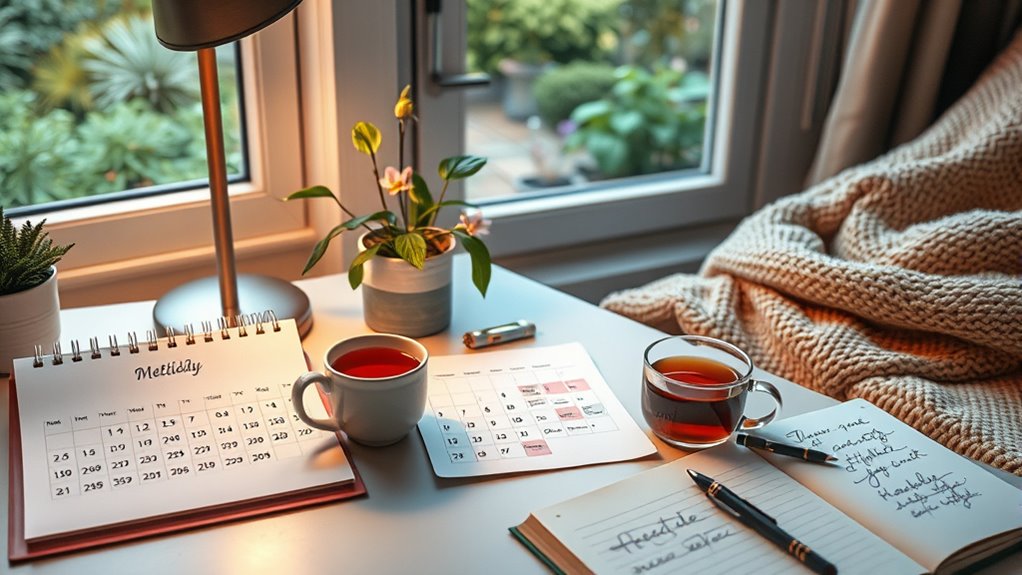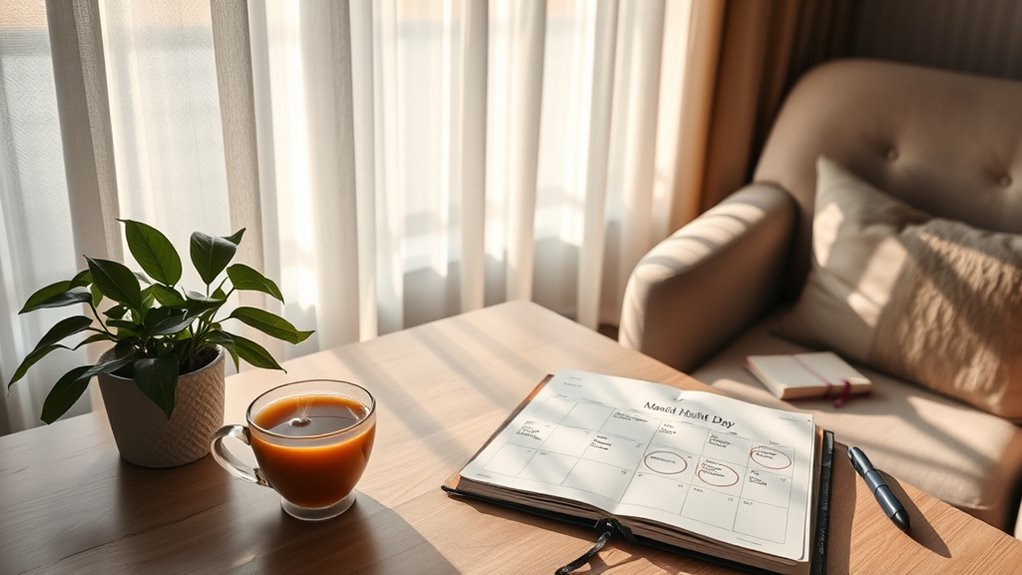To effectively schedule mental health days for recovery, plan them in advance to reduce last-minute stress. Use these days to focus solely on self-care activities like journaling, walks in nature, or disconnecting from screens. Recognize that taking time off is essential for your well-being and isn’t a sign of weakness. Support from your employer through flexible schedules can make this easier. Want tips on maximizing your mental health days? Keep going to learn more.
Key Takeaways
- Plan mental health days in advance to reduce last-minute stress and ensure proper preparation.
- Communicate with your employer about your needs and available accommodations for flexible scheduling.
- Prioritize self-care activities during your days off, such as meditation, walks, or journaling.
- Use these days to disconnect from screens and focus on restorative routines that promote mental clarity.
- View mental health days as essential for recovery, resilience, and maintaining long-term well-being.

Have you ever felt overwhelmed and wondered if taking a day off could help you recharge? It’s a common feeling, especially when life’s demands start piling up. Scheduling mental health days isn’t just about taking a break; it’s about prioritizing your well-being and recognizing that sometimes, you need more than just a quick pause. When you plan these days intentionally, you create space for self care routines that restore your mental clarity and emotional balance. Whether it’s a solo day of relaxation or a brief escape from your usual routine, these mental health days give you the opportunity to reset and regain your focus. The key is to see them as an essential part of your self-care, not a sign of weakness or failure. Incorporating simple self care routines like meditation, journaling, a walk in nature, or disconnecting from screens can make your mental health days even more effective. Workplace accommodations play a vital role here. Many employers are increasingly understanding of mental health needs and are willing to support you in taking mental health days. By communicating openly with your workplace, you can establish a system that allows you to step back when necessary without feeling guilty or pressured. Some workplaces offer flexible schedules, mental health days as part of paid time off, or the option to work remotely on days when you’re feeling overwhelmed. These accommodations make it easier for you to prioritize your mental health without disrupting your responsibilities. The more you advocate for yourself, the more your workplace recognizes the importance of mental wellness, creating a healthier environment for everyone. Planning your mental health days strategically can make a big difference. Think about incorporating self care routines that truly help you unwind—whether that’s meditation, journaling, a walk in nature, or simply disconnecting from screens. Use these days to focus on what makes you feel good, rather than pushing yourself to be productive. It’s important to remember that taking time off isn’t selfish; it’s a necessary step to maintain your overall health. When you schedule these days ahead of time, you avoid last-minute stress and guilt, making it easier to fully enjoy and benefit from them. Ultimately, your mental health days are a powerful tool for recovery. They remind you that your well-being isn’t optional—it’s a priority. By integrating effective self care routines and working with your employer on workplace accommodations, you’re setting yourself up for a sustainable approach to mental health. When you give yourself permission to pause and nurture your mind, you’re more prepared to face everyday challenges with resilience and clarity. Remember, taking care of yourself is a sign of strength, not weakness.
Frequently Asked Questions
How Often Should I Take Mental Health Days?
You should take mental health days as needed to maintain a healthy work-life balance and support your self-care routines. Listen to your body and mind—if you’re feeling overwhelmed, exhausted, or stressed, it’s time to schedule a day off. Regular breaks, perhaps once a month or whenever you notice signs of burnout, help you recharge, stay productive, and keep your mental health in check. Prioritize yourself to stay resilient.
Can Mental Health Days Be Counted as Sick Leave?
Yes, mental health days can be regarded as sick leave if your workplace policies include mental health under their sick leave or workplace accommodations. Check your company’s mental health policies to understand how they handle such days. Many organizations recognize mental health as a valid reason for sick leave, helping you access the support you need without risking job security. Always communicate openly with HR to ensure proper documentation and understanding.
What Activities Are Best During a Mental Health Day?
During a mental health day, you should focus on activities that promote relaxation and self-awareness. Try mindfulness exercises, like deep breathing or meditation, to center your mind. Engaging in creative outlets such as painting, journaling, or playing music helps release emotions and boost mood. These activities create a calming environment, allowing your mind to reset and recover. Prioritize what feels best for you to maximize the benefit of your mental health day.
How Do I Communicate My Mental Health Day to My Employer?
You should notify your employer by following workplace policies, whether that’s a quick email or a phone call. Keep your message simple and professional, emphasizing your need for a mental health day without sharing unnecessary details to safeguard your employee privacy. If needed, consult your HR department for guidance on the preferred process. This approach ensures clear communication while respecting your privacy and adhering to company policies.
Are Mental Health Days Effective for Long-Term Recovery?
Like a trusty quill in a modern world, mental health days can be highly effective for long-term recovery if you prioritize self-care strategies. They help reduce stigma, allowing you to address issues before they escalate. Consistently taking these days fosters resilience, boosts well-being, and enhances productivity. By normalizing mental health breaks, you build a sustainable routine that supports ongoing recovery, proving that self-care isn’t a one-time act but a crucial part of your journey.
Conclusion
So, next time you skip planning a mental health day, remember—you’re actually scheduling your own recovery. Ironically, taking time off might seem like a luxury you can’t afford, but it’s often the very thing that keeps you functioning. By neglecting your mental health, you risk burnout. So go ahead, mark that day on your calendar—because sometimes, the best way to stay ahead is simply to pause and breathe.









